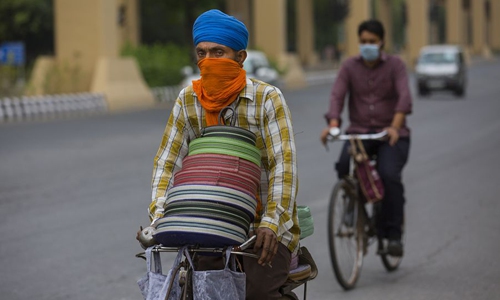Border clash 'old trick' for India
By GT staff reporters Source:Global Times Published: 2020/6/18 19:48:40
Tension won’t dent Chinese firms’ operations in South Asian market

A man covers his face with a piece of cloth as he cycles to transport goods during the lockdown in New Delhi, India, May 13, 2020.(Xinhua/Javed Dar)
The Indian government's ploy in using the border clash to shift attention from domestic public discontent to fire up anti-China nationalism is unlikely to dent Chinese firms' operations in the Indian market, Chinese business veterans told the Global Times Thursday.The sentiment aroused by boycotting Chinese goods is only a means of emotional expression, adding fuel to a complicated situation while doing no good to India, which is highly reliant on Chinese supplies in developing its industries, they noted.
Calls to boycott Chinese products are growing in India after violent clashes between the two countries' border troops in the Galwan Valley.
The local traders' body Confederation of All India Traders (CAIT) on Wednesday said it will further mobilize traders in India to boycott Chinese goods and support indigenous products, according to Indian media reports.
On Tuesday, the CAIT released a list of 500 categories of products imported from China that it said could be swapped for goods made in India, including apparel, consumer electronics and toys.
Chinese smartphone vendor Oppo cancelled the live online launch of its flagship smartphone in India on Wednesday after the border clash, Reuters reported. But the company told the Global Times Thursday that it did not cancel the Find X2 smartphone models.
"The launch took place via Youtube and we uploaded a pre-recorded video directly," it said.
The impact of the conflict has not hit Chinese businesses in India so far, although they will become more cautious and keep a low profile there, Chinese entrepreneurs who have been in India for years told the Global Times.
India has few cards to play if it wants to make noise about China to shift its internal problems, and initiating a military conflict is just one of those cards, said the head of a Chinese manufacturing firm in India who only gave his surname as Wang.
Living in India for over a decade, Wang told the Global Times on Thursday that "national sentiment acts as the Indian government's weapon to make its country stand against external changes, thus ignoring its own issues."
"Chinese firms that have operated in the market for long time know it's an old trick and will continue with their business," said Wang.
"The Indian government knows where the red line is, and it won't let emotions get out of hand and harm bilateral business ties in a genuine sense," he noted. Wang said the boycott will be over within three months.
But unlike the Doklam standoff in 2017, the Galwan clash -- which has caused some fatalities -- might affect bilateral ties for some time if the COVID-19 pandemic persists.
According to Johns Hopkins University, which is tracking COVID-19 data from all over the world, India is No.8 with 12,237 deaths from the virus.
Li, a general manager in the exhibition sector in India, was around during the Doklam standoff in 2017, and he lost all his orders from Indian customers.
"Back then, our Indian customers followed the anti-China sentiment and canceled orders, and we sustained a big loss," said Li. "Seven or eight people in my circle left India. We were worried that the standoff would turn into war."
Li returned to India last year to seek new opportunities. "Now all our clients are local Chinese firms, which can protect us from external instability like the event in 2017."
"This time [the border clash] is only an outlet for the Indian government to alleviate frustrations over economic pressure caused by COVID-19 -- it's a way to rescue made-in-India products and local businesses by striking a blow at Chinese goods," he noted.
Chinese businesses have a positive view of long-term bilateral economic and business ties. "India cannot risk losing China if it wants to realize its ultimate dream of becoming a world power," Wang said.
Bilateral trade has been on the uptrend despite numerous border conflicts. Total bilateral trade was 639.5 billion yuan ($90 billion) in 2019, up 1.6 percent year-on-year. China's exports to India stood at 515.6 billion yuan, up 2.1 percent, and India's exports to China totaled 123.9 billion yuan, down 0.2 percent year-on-year, data from China's General Administration of Customs showed.
Newspaper headline: Using border clash ‘old trick’ for India